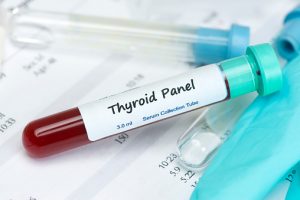
Hypothyroidism – the thyroid’s underproduction of essential hormones for bodily functions – affects nearly 10 million Americans. Traditional treatment of hypothyroidism involves regular supplementation of T4, which is then converted to T3 in the body and normalizes blood levels of T3. Unfortunately, this treatment does not relieve all symptoms in at least 15 percent of patients.
The researchers conducted their study on rats with thyroids removed to try and explain on a cellular level why normalized T3 blood levels do not relieve all symptoms of hypothyroidism. The study also revealed that by supplementing T3 along with T4, blood levels can become normalized.
Rats that only received T4 supplementation had higher cholesterol levels, compared to rats that received T3 and T4. Rats solely on T4 also had signs of hypothyroidism in their brains, which can contribute to foggy brains.
Senior author Antonio Bianco said, “Of course it’s important to confirm these studies clinically. Hypothyroid patients are not all the same. Some will do better on the combination therapy, others not. The challenge is to identify these individuals and understand why these differences exist.”
The researchers then looked at cadaver donor brains and found an accumulation of polymorphic D2 – the enzyme responsible for converting T4 into T3 – in areas where it is not commonly found. This abnormal D2 accumulation can contribute to malfunctioning of cells and is commonly seen in patients with neurodegenerative diseases.
Bianco added, “It is conceivable that the D2 polymorphism is a risk factor for neurodegenerative disease that could be aggravated when these patients develop hypothyroidism. If confirmed by additional studies, the findings with the D2 polymorphism explain why not all hypothyroid patients are the same, with some exhibiting one or additional risk factors for decreased cognition. It would seem that personalized medicine has caught up with hypothyroidism and might be able to ensure that treatment is effective in 100 percent of patients.”
Treatment of hypothyroidism
Hypothyroidism is a condition of underactive thyroid, so the body tends to function more slowly and produce less hormones. Aside from supplementing with T4, there are other treatment options as well, including radiation therapy, removal of the thyroid, treating the underlying condition that may be causing hypothyroidism, medication, and constant monitoring of thyroid function.
If your doctor puts you on medication, you will have to undergo blood work to check your hormone levels to ensure you are receiving the proper dose. Taking too little medication can lead to side effects like constipation, feeling cold, sluggish, and even weight gain. On the other hand, too much of the medication can lead to nervousness, sleep problems, and tremors. If you take too much medication and have heart problems, you may experience chest pains or irregular heartbeats as well. This is why it’s so important to monitor your blood throughout your treatment process to ensure proper dosing.
If you are experiencing any side effects due to the thyroid medication you are on, speak with your doctor about proper dosages and getting blood work done to verify if you are having too much or too little.
Related Reading:
Hypothyroidism vs. hyperthyroidism symptoms, living with thyroid disease
Hypothyroidism and hyperthyroidism are two common forms of thyroid disease, which – if left unmanaged – can make daily living quite challenging. Hypothyroidism is also known as an underactive thyroid, meaning the thyroid doesn’t produce enough hormones, thus slowing down bodily functions. In hyperthyroidism – overactive thyroid – the thyroid overproduces thyroid hormones, which in turn speeds up bodily functions. Continue reading…
Healing thyroid disorders hypothyroidism and hyperthyroidism naturally
The thyroid gland is prone to two main disorders: hypothyroidism (underactive thyroid) and hyperthyroidism (overactive thyroid). In hypothyroidism, the thyroid does not produce enough hormones causing many bodily functions to perform slower. In hyperthyroidism, too many hormones are being produced causing bodily systems to overwork. Continue reading…
Sources:
https://www.rush.edu/news/press-releases/rush-researchers-gain-new-insights-treatment-hypothyroidism
http://www.webmd.com/women/tc/hypothyroidism-treatment-overview